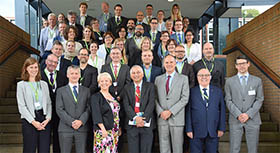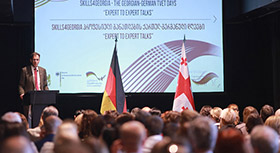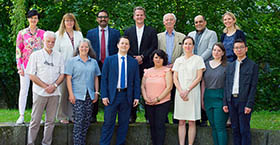
|
|||||||||||||||||||
|
|||||||||||||||||||
|
|||
|
Digitalisation is changing work tasks and occupational profiles at a rapid pace. This issue of BWP examines skills and qualifications requirements as well as further developments of learning within the work context. The topic of artificial intelligence has the potential to play a particular role in this regard. How will the world of work be changed by machines able to improve themselves and act autonomously? And what will this mean for the vocational training of skilled workers? |
|||
|
Editorial: Digitalisation and AI are conducive to increasing the attractiveness of vocational education and training Friedrich Hubert Esser, Prof. Dr., President of the Federal Institute for Vocational Education and Training Digitalisation and artificial intelligence continue to be decisive topics within politics, trade and industry, and society. BIBB has acted in a timely manner to address the associated question as to what consequences will ensue for the world of work and employment. Extensive research and development findings now provide a basis for delivering responses. |
|||
|
Changing inter-occupational competencies in the wake of the digital shift Gert Zinke Between 2016 and 2018, a project team at BIBB conducted occupation screenings as a part of the BMBF/BIBB initiative "VET 4.0 - Qualifications and competencies of skilled workers for the digitalised work of tomorrow".* The impacts of digitalisation were investigated for 14 recognised training occupations. The present article describes the approach adopted in the project and pools findings from the various sub-studies. The focus is directed towards competencies that are evaluated as being particularly important in cross cutting terms. The article concludes by outlining a proposal for how such competencies can be fostered within the framework of an altered didactic design to which training regulations are already according consideration. Read more Changing inter-occupational competencies in the wake of the digital shift |
|||
|
"What happens in the field is crucial!" Markus Bretschneider How are tasks and competencies in the agricultural sector changing as a result of digitalisation and networking, and how does vocational education and training need to react? On the basis of technology deployed, this article investigates the issue of how skills, knowledge and competencies are currently changing in the recognised training occupation of farmer, and which requirements and consequences this is creating at the curricular and practical level. In light of the growing significance of process and system competencies and handling data, the teaching module "Information-based agricultural technology" will be used as an example to show how competencies relating to the systematic use of production data can be practically imparted and how trainers can be supported in their daily work. Read more "What happens in the field is crucial!" |
|||
|
Similar and yet different-digitalisation and its consequences for individual occupational profiles Stephanie Conein, Inga Schad-Dankwart This article uses two occupations as examples to show that while ongoing digitalisation often leads to similar changes at skilled worker level if considered in general terms, closer investigation of the respective workplaces reveal that these changes exert different occupation-specific effects. Commonalities and differences in the occupations of industrial clerk and mechanic in plastics and rubber processing are highlighted with regard to technologies deployed, changed tasks and new skills requirements. The article concludes with some estimates of the further development of the two occupations given the conditions of digitalisation. Read more Similar and yet different-digitalisation and its consequences for individual occupational profiles |
|||
|
|||
|
Launch of the Bridging Innovation and Learning in TVET- project
Read more Further information |
|||
|
Skills4Georgia brings together German and Georgian VET experts
Read more Further information |
|||
|
Comparing occupational tasks across Europe
Read more Further information |
|||
|
Germany and South Africa are extending their cooperation in vocational education and training The German-South African vocational education and training cooperation has been renewed for a second time for a further period of three years. The successful collaboration between the two countries will thus continue. Read more Further informatiion |
|||
|
iMOVE's three-country conference a complete success
Read more Further information |
|||
|
|||
|
VET in Germany Report 2018 The VET in Germany Report 2018 gives an overview of the vocational educational and training (VET) system in Germany: external factors influencing VET; providing VET in a lifelong learning perspective; shaping VET qualifications and promoting participation in VET. This country report is part of a series of reports on vocational education and training produced for each EU Member State plus Norway and Iceland by members of ReferNet, Cedefop's European network of expertise in vocational education and training. Read more Further information (CEDEFOP) |
|||
|
|||
|
Call for Papers: 2nd BIBB Conference on the Economics of Vocational Education and Training: Markets - Institutions - Systems The BIBB hosts its second conference on the economics of vocational education and training (VET) on November 7th and 8th 2019 in Siegburg. The conference will bring together researchers from all related fields to discuss the most recent empirical and theoretical results on this subject. Registration is open between 1st of August and the 28th of October 2019. Read more Call for Papers |
|||
| Imprint | |
|
Bundesinstitut für Berufsbildung (BIBB) Friedrich-Ebert-Allee 114 – 116 Editorial Team:
|
|




